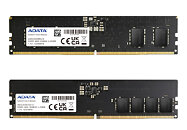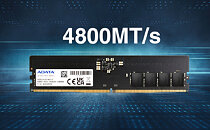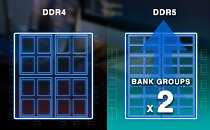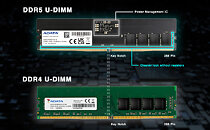- Joined
- Oct 9, 2007
- Messages
- 46,391 (7.67/day)
- Location
- Hyderabad, India
| System Name | RBMK-1000 |
|---|---|
| Processor | AMD Ryzen 7 5700G |
| Motherboard | ASUS ROG Strix B450-E Gaming |
| Cooling | DeepCool Gammax L240 V2 |
| Memory | 2x 8GB G.Skill Sniper X |
| Video Card(s) | Palit GeForce RTX 2080 SUPER GameRock |
| Storage | Western Digital Black NVMe 512GB |
| Display(s) | BenQ 1440p 60 Hz 27-inch |
| Case | Corsair Carbide 100R |
| Audio Device(s) | ASUS SupremeFX S1220A |
| Power Supply | Cooler Master MWE Gold 650W |
| Mouse | ASUS ROG Strix Impact |
| Keyboard | Gamdias Hermes E2 |
| Software | Windows 11 Pro |
ADATA Technology, a manufacturer of high-performance DRAM modules, NAND Flash products, mobile accessories, gaming products, electric power trains, and industrial solutions today announces the ADATA DDR5-4800, a next-generation DDR5 memory module that is capable of reaching frequencies of up to 4800MT/s and comes with up to 32 GB of capacity. In addition, ADATA has worked with six major motherboard brands, including AORUS, ASROCK, ASUS, GIGABYTE, MSI and ROG to ensure optimal performance and compatibility across a wide range of motherboards.
"Through our strong R&D capabilities and close partnerships with the world's leading motherboard makers, we are committed to offering memory modules with next-generation performance, higher capacities, and enhanced stability," said Nick Dai, Senior Manager of DRAM Products at ADATA. "In the coming months, we will continue to launch a diverse array of DDR5 products to meet the different needs of creators, gamers, and other users."




An Upgrade in Speed, Capacity, and Stability
In view of more processor cores being used and greatly increased bandwidth in recent years, higher performance memory modules are crucial to staying up to speed in the era of 5G, IoT, and WiFi 6. Compared with previous-generation memory modules, DDR5 allows each CPU core to be allocated more bandwidth, greatly improving overall PC performance. The ADATA DDR5-4800 clocks in at up to 4800 MHz and come in either 8 GB, 16 GB, or 32 GB variants for excellent performance and ample capacity. It also sports Error Correcting Code technology and a built-in Power Management Integrated Circuit (PMIC) for accurate data transmissions and improved energy efficiency.
Ensuring Optimal Performance and Compatibility through Collaboration
The INTEL 12th generation platform will soon welcome the use of DDR5 memory modules by the end of October, and ADATA has conducted joint testing with motherboard brands AORUS, ASROCK, ASUS, GIGABYTE, MSI and ROG to ensure compatibility and optimal performance. The DDR5-4800 memory module will be offered in a single stick of 8 GB, 16 GB, and 32 GB capacities or a dual kit of 8GBx2, 16 GB x2, and 32 GB x2 capacities. SO-DIMM variants will be available by fourth quarter of this year to meet the needs of laptop users.
The Utmost Quality and Reliability
The ADATA DDR5-4800 memory module is made from high-quality chips, has undergone strict testing, and complies with JEDEC and RoHS standards for the utmost in quality and reliability. For added peace of mind, the module comes with a lifetime warranty.
View at TechPowerUp Main Site
"Through our strong R&D capabilities and close partnerships with the world's leading motherboard makers, we are committed to offering memory modules with next-generation performance, higher capacities, and enhanced stability," said Nick Dai, Senior Manager of DRAM Products at ADATA. "In the coming months, we will continue to launch a diverse array of DDR5 products to meet the different needs of creators, gamers, and other users."




An Upgrade in Speed, Capacity, and Stability
In view of more processor cores being used and greatly increased bandwidth in recent years, higher performance memory modules are crucial to staying up to speed in the era of 5G, IoT, and WiFi 6. Compared with previous-generation memory modules, DDR5 allows each CPU core to be allocated more bandwidth, greatly improving overall PC performance. The ADATA DDR5-4800 clocks in at up to 4800 MHz and come in either 8 GB, 16 GB, or 32 GB variants for excellent performance and ample capacity. It also sports Error Correcting Code technology and a built-in Power Management Integrated Circuit (PMIC) for accurate data transmissions and improved energy efficiency.
Ensuring Optimal Performance and Compatibility through Collaboration
The INTEL 12th generation platform will soon welcome the use of DDR5 memory modules by the end of October, and ADATA has conducted joint testing with motherboard brands AORUS, ASROCK, ASUS, GIGABYTE, MSI and ROG to ensure compatibility and optimal performance. The DDR5-4800 memory module will be offered in a single stick of 8 GB, 16 GB, and 32 GB capacities or a dual kit of 8GBx2, 16 GB x2, and 32 GB x2 capacities. SO-DIMM variants will be available by fourth quarter of this year to meet the needs of laptop users.
The Utmost Quality and Reliability
The ADATA DDR5-4800 memory module is made from high-quality chips, has undergone strict testing, and complies with JEDEC and RoHS standards for the utmost in quality and reliability. For added peace of mind, the module comes with a lifetime warranty.
View at TechPowerUp Main Site



